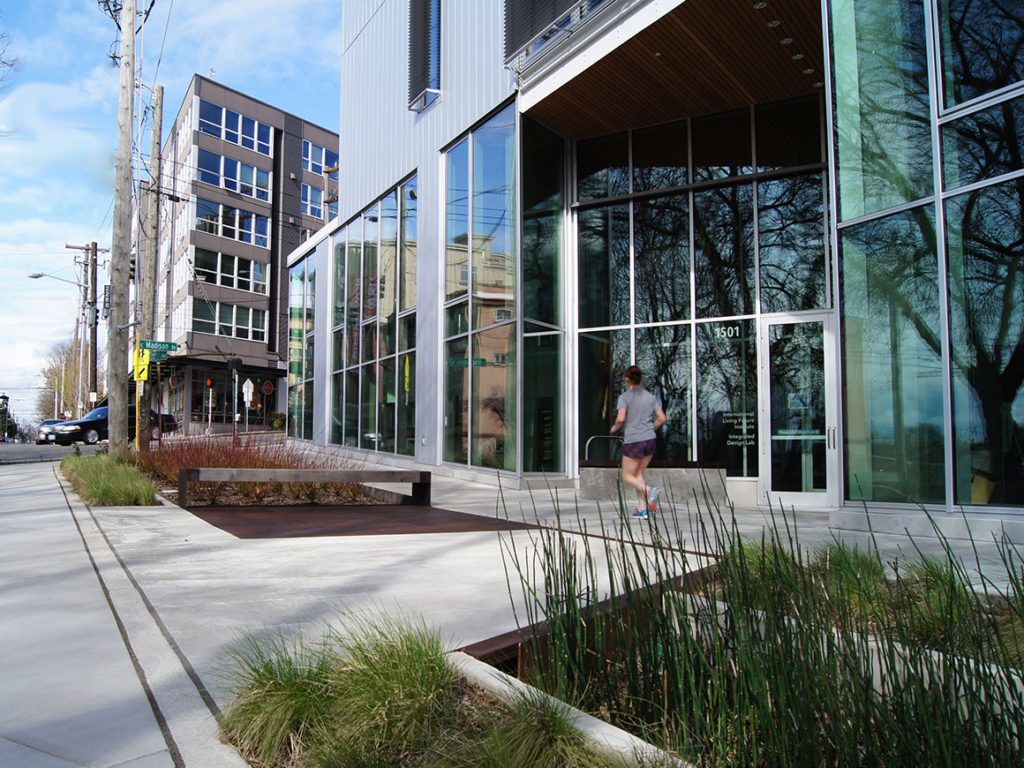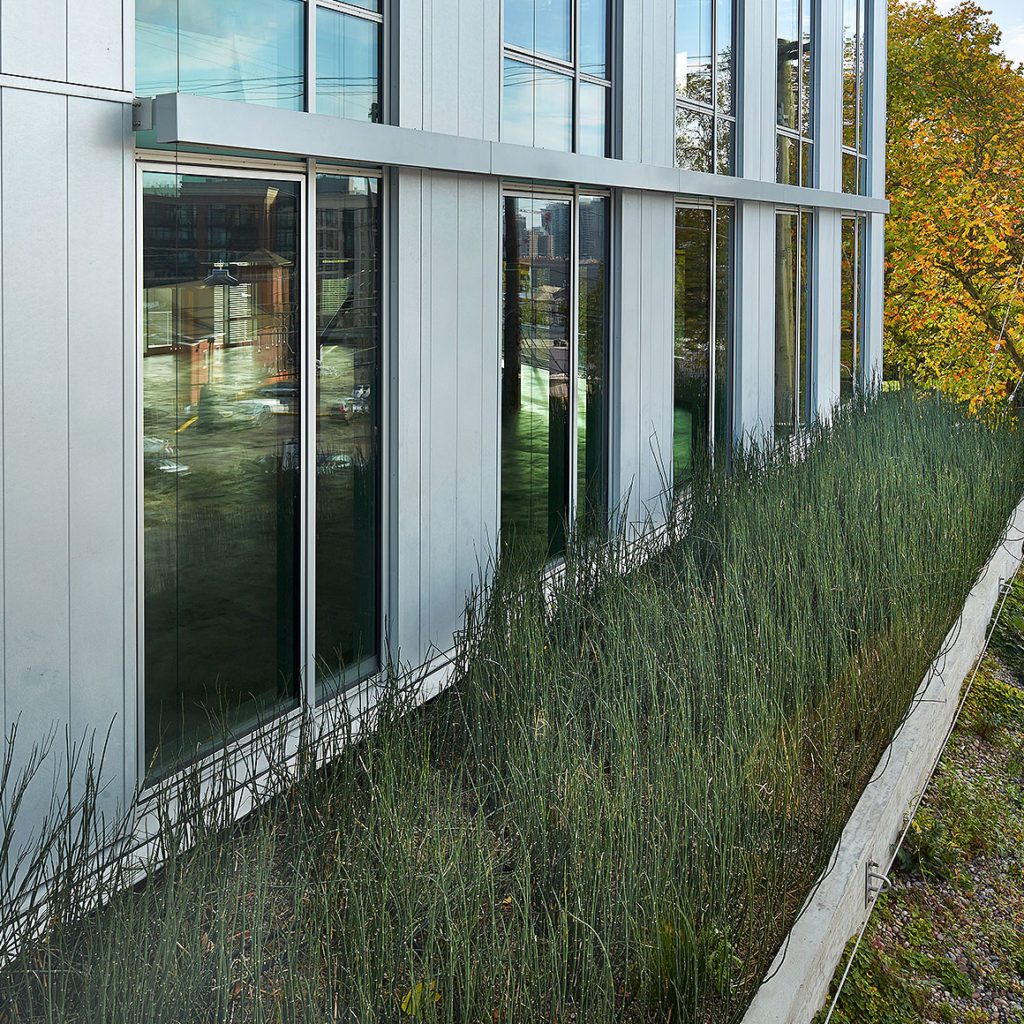Bullitt Center Earns Living Building Certification
SEATTLE – Today the Bullitt Center proved its status as the greenest commercial building in the world by becoming the first office building to earn Living Building certification, the most challenging benchmark of sustainability in the built environment.
To earn the certification, the Bullitt Center demonstrated that it produces more electricity from solar panels on its roof than occupants use in a year. In addition, toxic chemicals were screened from all building materials and all wood was Forest Stewardship Council certified. Its occupants’ human waste is composted and rainwater is captured for all uses, including drinking.
“We made a huge, bold bet that human creativity could overcome dozens of unprecedented challenges,” said Denis Hayes, CEO of the Bullitt Foundation and the Bullitt Center. “If Living Buildings can be built and operated in Seattle, the cloudiest major city in the contiguous 48 states, they can and should be built everywhere.”
In 2014, the Bullitt Center produced 60 percent more energy from solar panels on its roof than it used, largely due to efficiencies that exceeded expectations, making it the most energy efficient office building in the United States and possibly in the world.

“Quite simply, this is one of the most important buildings in the world,” said Jason F. McLennan, CEO of the International Living Future Institute. “The Bullitt Center proves that dramatic improvements are possible when a talented group shoots for the stars.”
The Bullitt Center was developed to show the current state-of-the-art in sustainable design, to influence development and operation of other buildings.

“This project continues to generate interest from owners and project teams around the world,” said Chris Rogers, CEO of Point32, the developer and owner’s representative. “The Bullitt Center shows it’s possible to push the envelope and still deliver a steady stream of benefits for the owner, occupants and society for many years to come.
The Bullitt Center was the type of design challenge architects dream about,” said Brian Court, Partner at The Miller Hull Partnership, the architect. “The project is a new prototype, a building with essentially no environmental footprint, and the performance-based design process required to create it has changed the way we think about design moving forward.”
“To achieve the ambitious performance goals, the integrated design team overcame some big technical challenges,” said Paul Schwer, Principal at PAE Consulting Engineers, the lead engineer. “We hit the mark because the architect, engineer and contractor all worked together in a highly collaborative way.”
“If delivering the world’s first living office building weren’t challenging enough, then a tight urban site only added to the many complexities,” said Casey Schuchart, Building Division Manager at Schuchart, the general contractor. “It wasn’t only Schuchart’s first living building, but our subcontractors’ too. We had a team that truly rose to the occasion by developing products and techniques that didn’t even exist at groundbreaking.”
“Unico is honored to be the operating partner for the Bullitt Foundation, working to maximize the Bullitt Center’s day-to-day performance,” said Brian Pearce, Unico Properties Senior Vice President of Property Management. “Delivering our suite of property management services demonstrates what is possible when transformative design partners with superior operations to create a more resilient building—both environmentally and financially—that will endure for years to come.”
Projects in 12 countries are registered in the Living Building Challenge and six other projects have been certified to date, including McGilvra Place Park, a public space immediately adjacent to the Bullitt Center. McGilvra Place is the first “Living Park” to meet the Landscape Typology requirements of the Challenge.
“I have dreamed of building something truly sustainable—something that didn’t just minimize harm but that actually improved the earth—since I was a teenager,” said Hayes. “Today, because of the deep commitment of an all-star team of architects, engineers, contractors, regulators, lawyers, politicians, and even bankers, Seattle has become the home of the greenest building in the world.”
Bullitt Center
A 52,000 square-foot commercial building at the intersection of Capitol Hill and the Central Area in Seattle, the Bullitt Center is designed, built and operated to be the world’s greenest office building. Owned by the Bullitt Foundation, the building cost $32.5 million. As a market-rate, Class-A commercial office building, the Bullitt Center was developed to show what’s possible today and to demonstrate a path forward for other real estate development projects. Hundreds of architects, developers, engineers, public officials and students from across the world have visited the building to carry lessons home to their own work. For more information visit www.bullittcenter.org.
Download a new financial analysis of the Bullitt Center here: http://bit.ly/Bullitt_Financial
International Living Future Institute and Living Building Challenge
International Living Future Institute is an environmental NGO committed to catalyzing the transformation toward communities that are socially just, culturally rich and ecologically restorative. Composed of leading green building experts and thought-leaders, the Institute is premised on the belief that providing a compelling vision for the future is a fundamental requirement for reconciling humanity’s relationship with the natural world. The Institute operates the Living Building Challenge, the world’s most rigorous building performance standard. The Challenge is a philosophy, an advocacy tool and a certification program. Launched in 2006, more than 250 projects (totaling over 9 million square feet of space) are currently registered for the Challenge. For more information visit www.living-future.org.
Media Contact:
Brad Kahn, 206-419-1607, brad@groundworkstrategies.com
For more information on the Bullitt Center, see this article from Trim Tab.
To see Berger’s role on the project, led by Jonathan Morley and Rachael Meyer, see our website.